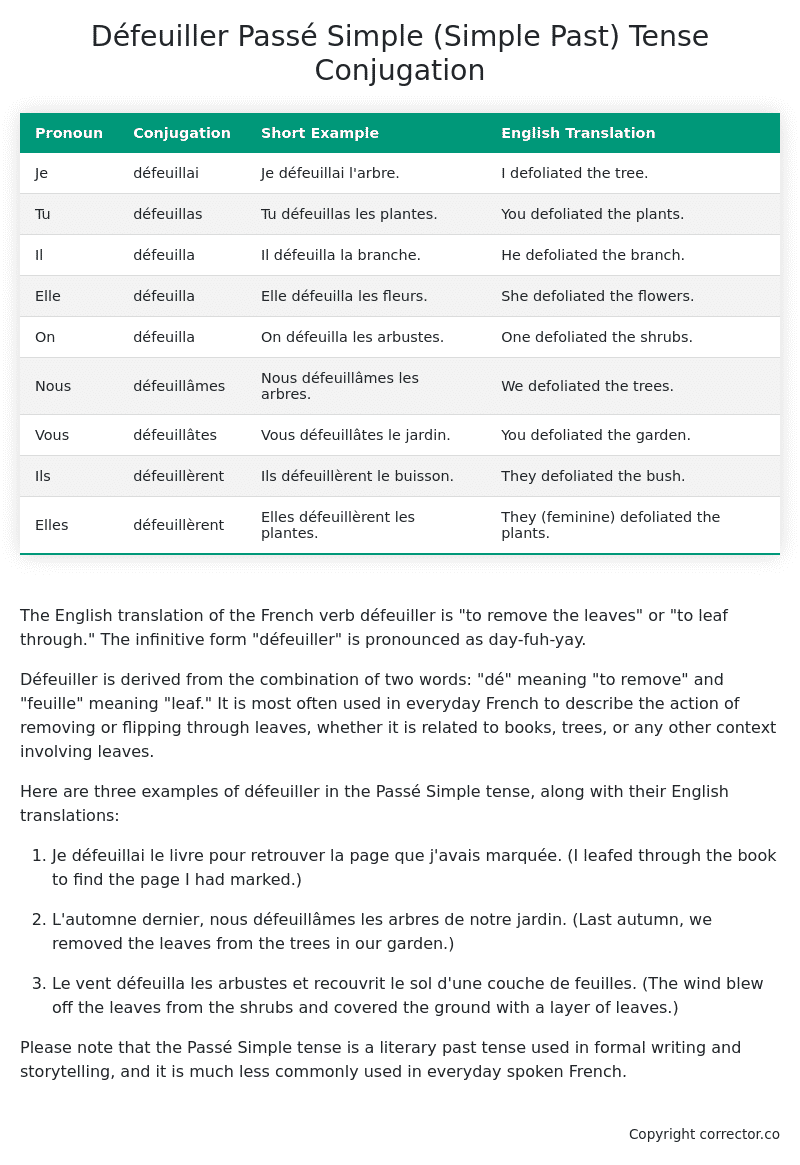Passé Simple (Simple Past) Tense Conjugation of the French Verb défeuiller
Introduction to the verb défeuiller
The English translation of the French verb défeuiller is “to remove the leaves” or “to leaf through.” The infinitive form “défeuiller” is pronounced as day-fuh-yay.
Défeuiller is derived from the combination of two words: “dé” meaning “to remove” and “feuille” meaning “leaf.” It is most often used in everyday French to describe the action of removing or flipping through leaves, whether it is related to books, trees, or any other context involving leaves.
Here are three examples of défeuiller in the Passé Simple tense, along with their English translations:
-
Je défeuillai le livre pour retrouver la page que j’avais marquée.
(I leafed through the book to find the page I had marked.) -
L’automne dernier, nous défeuillâmes les arbres de notre jardin.
(Last autumn, we removed the leaves from the trees in our garden.) -
Le vent défeuilla les arbustes et recouvrit le sol d’une couche de feuilles.
(The wind blew off the leaves from the shrubs and covered the ground with a layer of leaves.)
Please note that the Passé Simple tense is a literary past tense used in formal writing and storytelling, and it is much less commonly used in everyday spoken French.
Table of the Passé Simple (Simple Past) Tense Conjugation of défeuiller
| Pronoun | Conjugation | Short Example | English Translation |
|---|---|---|---|
| Je | défeuillai | Je défeuillai l’arbre. | I defoliated the tree. |
| Tu | défeuillas | Tu défeuillas les plantes. | You defoliated the plants. |
| Il | défeuilla | Il défeuilla la branche. | He defoliated the branch. |
| Elle | défeuilla | Elle défeuilla les fleurs. | She defoliated the flowers. |
| On | défeuilla | On défeuilla les arbustes. | One defoliated the shrubs. |
| Nous | défeuillâmes | Nous défeuillâmes les arbres. | We defoliated the trees. |
| Vous | défeuillâtes | Vous défeuillâtes le jardin. | You defoliated the garden. |
| Ils | défeuillèrent | Ils défeuillèrent le buisson. | They defoliated the bush. |
| Elles | défeuillèrent | Elles défeuillèrent les plantes. | They (feminine) defoliated the plants. |
Other Conjugations for Défeuiller.
Le Present (Present Tense) Conjugation of the French Verb défeuiller
Imparfait (Imperfect) Tense Conjugation of the French Verb défeuiller
Passé Simple (Simple Past) Tense Conjugation of the French Verb défeuiller (You’re reading it right now!)
Passé Composé (Present Perfect) Tense Conjugation of the French Verb défeuiller
Futur Simple (Simple Future) Tense Conjugation of the French Verb défeuiller
Futur Proche (Near Future) Tense Conjugation of the French Verb défeuiller
Plus-que-parfait (Pluperfect) Tense Conjugation of the French Verb défeuiller
Passé Antérieur (Past Anterior) Tense Conjugation of the French Verb défeuiller
Futur Antérieur (Future Anterior) Tense Conjugation of the French Verb défeuiller
Subjonctif Présent (Subjunctive Present) Tense Conjugation of the French Verb défeuiller
Subjonctif Passé (Subjunctive Past) Tense Conjugation of the French Verb défeuiller
Subjonctif Imparfait (Subjunctive Imperfect) Tense Conjugation of the French Verb défeuiller
Subjonctif Plus-que-parfait (Subjunctive Pluperfect) Tense Conjugation of the French Verb défeuiller
Conditionnel Présent (Conditional Present) Tense Conjugation of the French Verb défeuiller
Conditionnel Passé (Conditional Past) Tense Conjugation of the French Verb défeuiller
Conditionnel Passé II (Conditional Past II) Tense Conjugation of the French Verb défeuiller
L’impératif Présent (Imperative Present) Tense Conjugation of the French Verb défeuiller
L’impératif Passé (Imperative Past) Tense Conjugation of the French Verb défeuiller
L’infinitif Présent (Infinitive Present) Tense Conjugation of the French Verb défeuiller
L’infinitif Passé (Infinitive Past) Tense Conjugation of the French Verb défeuiller
Le Participe Présent (Present Participle) Tense Conjugation of the French Verb défeuiller
Le Participe Passé (Past Participle) Tense Conjugation of the French Verb défeuiller
Struggling with French verbs or the language in general? Why not use our free French Grammar Checker – no registration required!
Get a FREE Download Study Sheet of this Conjugation 🔥
Simply right click the image below, click “save image” and get your free reference for the défeuiller Passé Simple tense conjugation!

Défeuiller – About the French Passé Simple (Simple Past) Tense
Formation
Usage
Narration
Historical Context
Interactions with other tenses
Passé Composé
Imparfait
Conditional and Subjunctive
Summary
I hope you enjoyed this article on the verb défeuiller. Still in a learning mood? Check out another TOTALLY random French verb conjugation!


